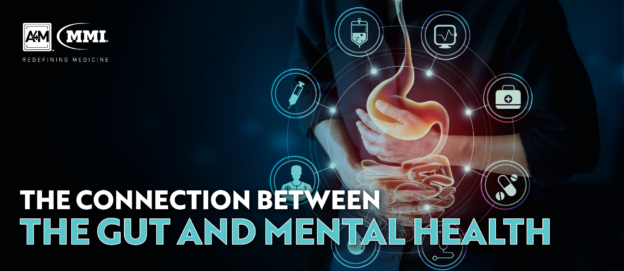In the past few years, the connection between the brain, gut, and microbiome has become an increasingly examined topic in the medical research community. As more research continues to prove this bidirectional link, there is a growing awareness of the importance of gut health not just for gastrointestinal health but also for overall physical and mental wellbeing. Studies of the connection between the gut and physical health have revealed the powerful effects of the microbiome on the immune system, mood, energy levels, and a range of other bodily aspects.
Although the microbiome-brain connection has been explored thoroughly in animal studies, research in humans is lacking. However, studies are increasingly suggestive of the effects of specific bacterial strains residing in the gut on the brain, and their impact on mental health and quality of life. Additionally, psychosocial factors– such as depression or anxiety – have been found to influence the physiology of the gut by moving and contracting the GI tract, increasing inflammation and lowering immunity. As the body of research grows, the connection between gut and mental health is becoming clearer and more indicative of the need to maintain a healthy microbiome.
The Gut-Brain Connection
Thousands of bacteria populate the microbiome, normally existing in a state of balance favorable to good bacteria. Health issues and potential harm arise during imbalances in the microbiome caused by an overgrowth of bad bacteria. Currently, researchers believe that controlling bacteria levels in the microbiome can lead to improved mental health and symptoms especially in patients with bipolar disorder, anxiety, and depression.
The connection works both ways, as a review of 13 studies revealed. Patients showed greater improvements in digestive symptoms when trying psychologically-based approaches than when relying on standard medication alone.
Depression, Quality of Life, and the Microbiome
While the neuroactive potential of microbial metabolites is under examination, several studies have linked imbalances in the gut microbiome to lowered quality of life and depression. A recent study published in Nature Microbiology identified groups of bacteria associated with depression and quality of life across populations. The team of researchers analyzed fecal microbiota data from patients enrolled in the Flemish Gut Flora Projectto further explore the relationship between the gut and mental health and identified two crucial bacteria. Patients with depression had depleted levels of Coprococcus and Dialister, regardless of antidepressant adherence. Their findings were further validated in two separate cohorts of clinically depressed individuals.
A previous review conducted by the Texas Tech University research team examined the gut-brain-axis, its possible role in mental illness, and the potential efficacy of probiotics in treatment. The study supported the importance of the gut microbiota in patients suffering from anxiety and depression caused by dysbiosis and inflammation in the central nervous system. Additionally, researchers found that imbalances in the gut could be mitigated with probiotics although there is a lack of regulation of their recommended use.
Gut Health and Post-Partum Mental Health
The importance of a healthy microbiome is especially evident in pregnant and post-partum women. A new study analyzed the risk of post-partum psychiatric disorders in women with inflammatory bowel disease (IBD). Examining population-based health administrative data of all women with singleton live births in Ontario, Canada over a 12-year period, researchers discovered that inflammatory conditions such as ulcerative colitis and Crohn’s disease increased the risk of new-onset mental illness.
One-fifth of pregnant women with IBD developed a mental illness upon giving birth and an elevated risk was found in post-partum women with Crohn’s disease. These women faced an increased risk of mood disorders, as well as substance abuse disorders however, there was no added risk for psychotic disorders. This newfound evidence reveals the need for increased preventative treatment and early detection for women with IBD, especially during pregnancy and the post-partum phase.
The findings above underscore the significant effect of restoration and maintenance of gut health, which could ultimately lead to improved quality of life and decreased mental illness symptoms while promoting overall physical health. Research implicates the need for a strong balance in favor of beneficial bacteria in the microbiome, which can be achieved through a well-balanced diet centered around probiotic and prebiotic ingredients. Further research in the field could identify the role of different bacteria in mental health conditions along with the mechanisms involved, clarifying the function of the microbiome-gut-brain axis and potential treatment options.

